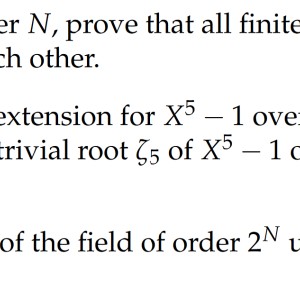a. Let $F$ be a finite field of order $2^N$. Its multiplicative subgroup has order $2^N - 1$, so every element of $F$ except $0$ must satisfy $x^{2^N - 1} = 1$, so every element of $F$ must be a root of $x^{2^N} - x$. But this is a polynomial of degree $2^N$, so it has at most $2^N$ distinct roots, so $F$ must be the splitting field of this polynomial over $\mathbb{F}_2$. This means that $F$ is Galois and unique up to isomorphism.
b. We have that $x^5 - 1 = (x-1)(x^4 + x^3 + x^2 + x + 1)$, so $\zeta_5$ is a root of a polynomial of degree $4$, so its degree is either $2$ or $4$, so $\mathbb{F}_2(\zeta_5)$ has order either $4$ or $8$. By what we showed in point a., $\mathbb{F}_2(\zeta_5)$ must be isomorphic to either $\mathbb{F}_4$ or $\mathbb{F}_{16}$. Let $\alpha \in \mathbb{F}_4$, with $\alpha \neq 0$. By what we showed before, $\alpha^3 = 1$, so $\alpha^4 + \alpha^3 + \alpha^2 + \alpha + 1 = \alpha + 1 + \alpha^2 + \alpha + 1 = \alpha^2 \neq 0$, so $\alpha$ cannot be a root of $x^5 - 1$. This means that $\zeta_5 \not \in \mathbb{F}_4$, so $\mathbb{F}_2(\zeta_5) = \mathbb{F}_{16}$, so \[ [ \mathbb{F}_2(\zeta_5) : \mathbb{F}_2 ] = 4. \]
c. For $\alpha \in F$, let $d$ be the minimum positive integer such that $\alpha^{2^d} = \alpha$. Then $\alpha$ belongs to some subfield of $F$ isomorphic to $\mathbb{F}_{2^d}$. It is easy to see that $d \mid 12$: if it doesn't, then $\alpha^{2^d} = \alpha$ and $\alpha^{2^{12}} = \alpha$ imply that $\alpha^{2^{\gcd(d, 12)}} = \alpha$, but if $d \not \mid 12$ then $\gcd(d, 12) < d$, a contradiction because $d$ was the minimum.
Let $K$ be any subfield of $F$, and let $d$ be the minimum positive integer such that $\alpha^{2^d} = \alpha$ for each $\alpha \in K$. We already showed that this is a divisor of $12$ for each element of $F$, so $d$ must divide $12$.
We claim that $K = \mathbb{F}_{2^d}$. Since any subfield of order $2^n$ for some $n$ must be Galois, then $K$ must contain all the roots of $x^{2^d} - x$. Moreover, since all its elements are roots of $x^{2^d} - x$, it must coincide with the set of roots of $x^{2^d} - x$, so $K = \mathbb{F}_{2^d}$ (up to isomorphism).
Finally, given $d \mid 12$, the polynomial $x^{2^d} - x$ is a factor of $x^{2^{12}}-x$, so it must split completely in $F$, so $F$ must contain a subfield isomorphic to $\mathbb{F}_{2^d}$, given by the roots of $x^{2^d} - x$ in $F$.
Alternative (more difficult) solution: We showed that a field $F$ of order $2^{12}$ is Galois. The Galois group is cyclic: let $\sigma(x) = x^2$. Since every element of $\mathbb{F}_2$ satisfies $x^2 = x$, and since in characteristic $2$ we have $(x+y)^2 = x^2 + y^2$, then $\sigma$ is linear and it belongs to the Galois group. We claim that it has order $12$. Let $i \in \mathbb{N}$, $i > 0$ and suppose that $\sigma^i(\alpha) = \alpha$ for all $\alpha \in F$. Then every element of $F$ is a root of $x^{2^i} - x$, but since this polynomial has at most $2^i$ distinct roots and $F$ has order $2^{12}$, then $i \geq 12$. On the other hand, we know that every element of $F$ is a root of $x^{2^{12}} - x$, so $i$ is a multiple of $12$, so $Gal(F/\mathbb{F}_2) = \mathbb{Z}/12\mathbb{Z}$, so its subfields correspond to the subgroups of $\mathbb{Z}/12\mathbb{Z}$, which in turn corresponds to divisors of $12$: given $d \mid 12$, there is exactly one subfield of $F$ of order $2^{12/d}$, and since all the fields of order $2^a$ are isomorphic, it must be isomorphic to $\mathbb{F}_{2^{12/d}}$.
This means that all the proper subfields of $F$ are isomorphic to $\mathbb{F}_d$ for some $d \mid 12$ (just exclude $12$ to get proper subfields), and for each divisor there is a subfield.


